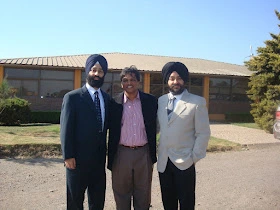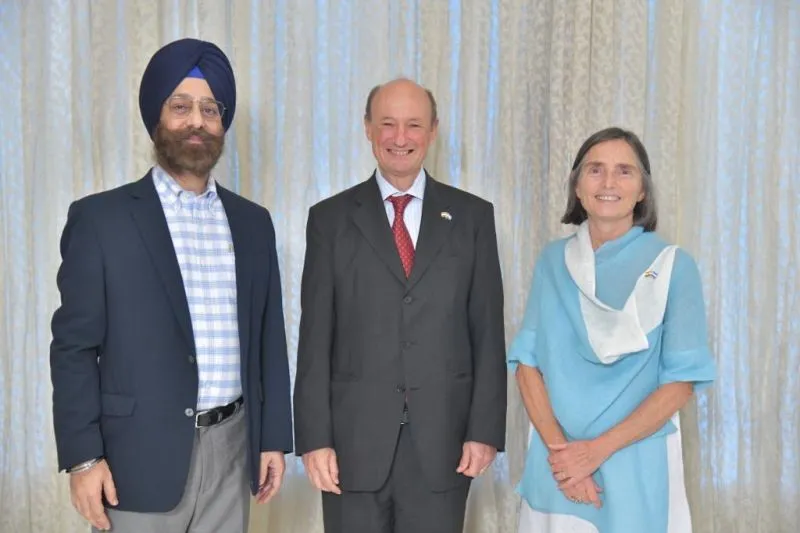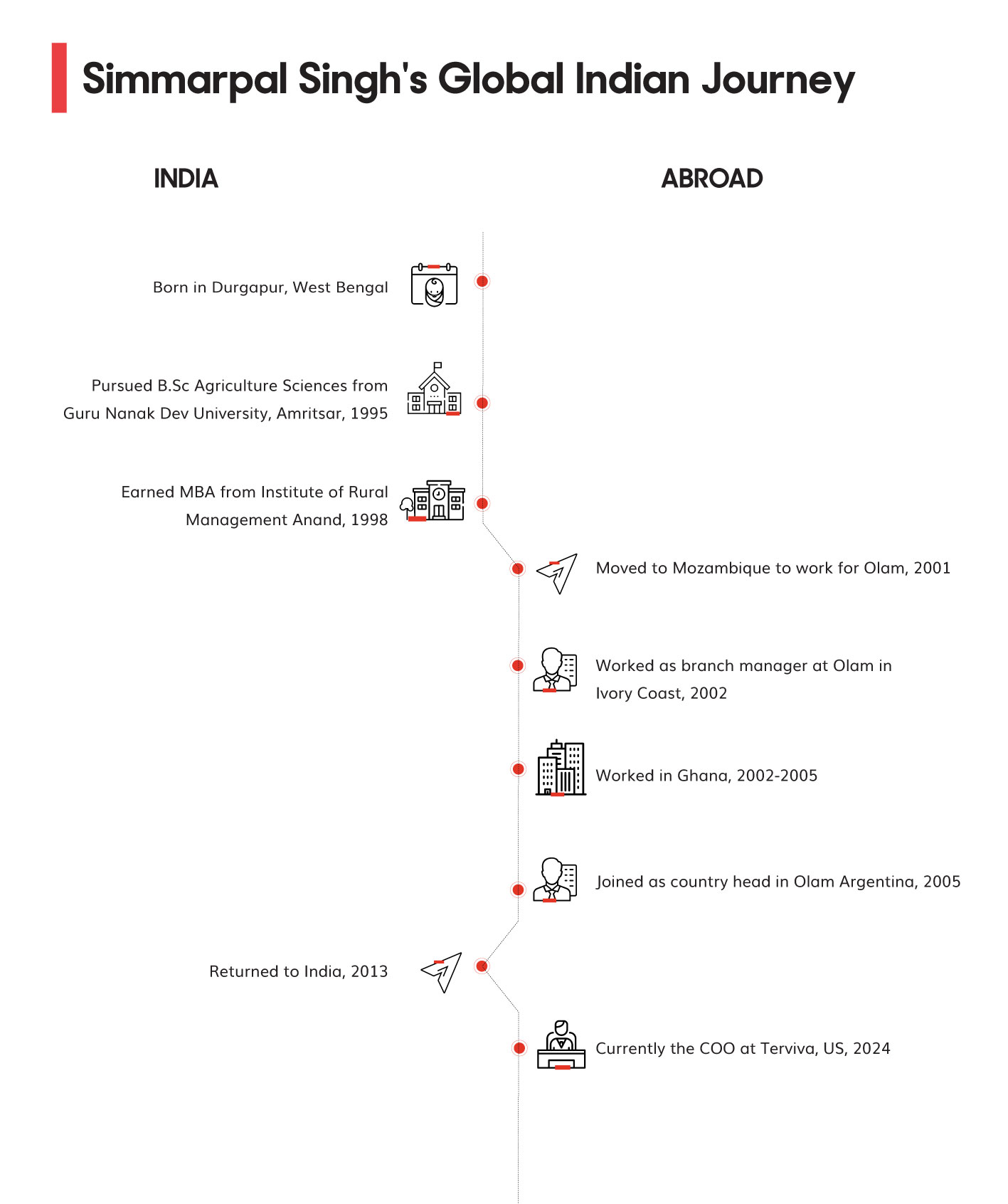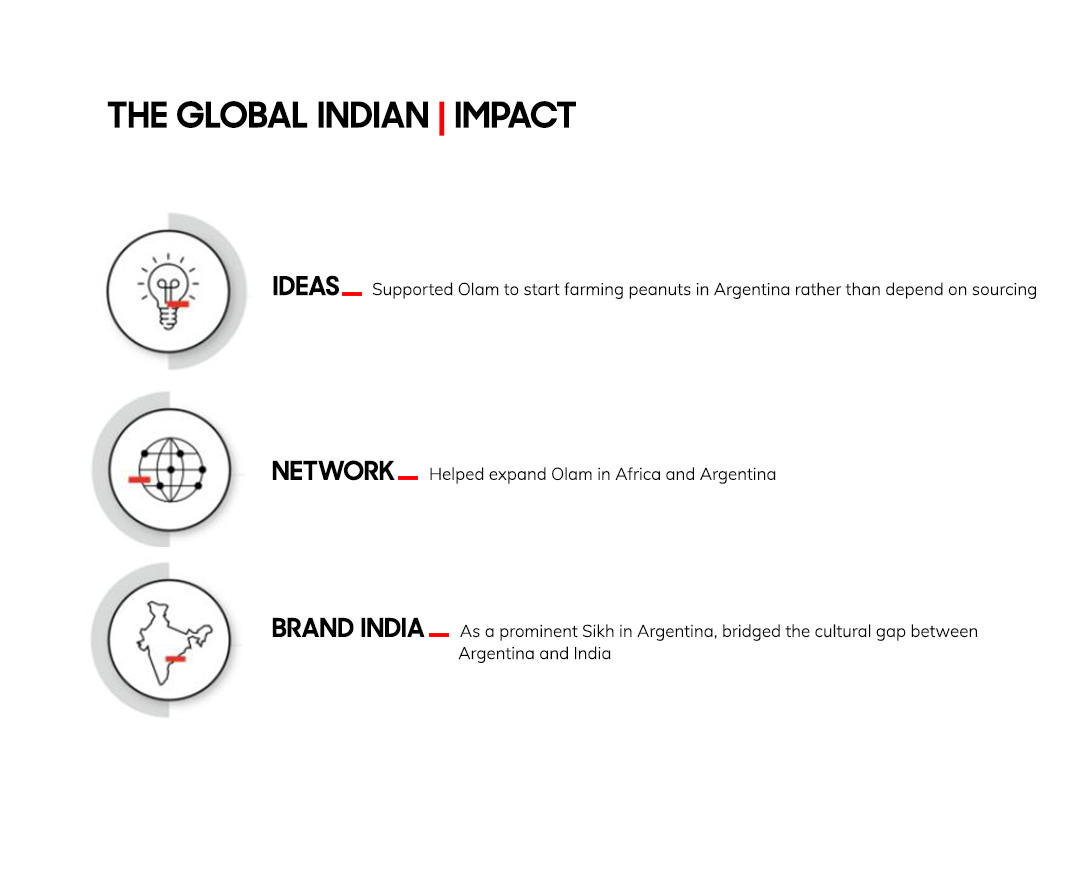(October 21, 2024) As a young boy growing up in Durgapur in West Bengal, Simmarpal Singh would often find himself glued to the television, watching Diego Maradona and his teammates create magic on the soccer field. But little did Simmarpal know that he would one day make a name for himself in Argentina — not in the world of football, but in the fields of peanuts, where he would eventually earn the title, the ‘Peanut Prince of Argentina.’
By the time Simmarpal arrived in Argentina in 2005, he was already an experienced agricultural expert, having worked in Africa with the Singapore-based Olam International. His mission in Argentina was clear: buy peanuts for Olam’s global operations. What wasn’t clear at the time was that Singh would soon spearhead one of the most successful agricultural ventures in the country, forever leaving his mark not only on Argentina’s peanut industry but also on the broader landscape of agricultural innovation. “Initiated the farm to factory peanuts business and in a five-year span, scaled it up to 39K hectares by diversifying into other crops like soybean, corn, alubias, rice farming and manufacturing through four processing plants,” Singh wrote on his LinkedIn.

Simmarpal Singh
India-Africa-Latin America
Born in a Sikh family, Simmarpal finished his schooling at St Xavier’s School in Durgapur before graduating in B.Sc Agriculture Sciences from Guru Nanak Dev University in Amritsar. Passionate about agriculture, he later enrolled himself at the Institute of Rural Management Anand in Gujarat. After working with the National Dairy Development Board and Amul, he joined Olam in Mozambique as a branch manager. This was the beginning for his global journey which later took him to Ivory Coast and Ghana before foraying into Argentina as country head.
When Simmarpal Singh first arrived in Argentina, Olam International had been operating primarily as a trader and processor. The peanut business was well-established, and dominated by long-standing local relationships and contracts. Singh quickly realised that buying peanuts from established farmers, who were already tied to other companies, would be a challenge. But where others saw an obstacle, Singh saw an opportunity. Rather than relying solely on sourcing from local farmers, Singh proposed a bold new idea: Why not start farming the peanuts themselves?

Simmarpal Singh in Argentina
It was an ambitious plan, especially for a company like Olam that had never ventured into large-scale farming before. But Singh’s agricultural background gave him the expertise and confidence to push the project forward. He started small, leasing 700 hectares of land to test the waters. The pilot was a success, and in just a few years, Singh had scaled up the operation to a staggering 39,000 hectares, transforming Olam into a major player in Argentina’s peanut industry. Simmarpal began from scratch, learning large-scale farming in Argentina, which was Olam’s first foray into raw crop farming. The company now cultivates 40,000 hectares of crops in various provinces of Argentina, and is one of the top seven peanut players in the country.
This rapid growth earned him the title “Peanut Prince of Argentina,” a nickname given by India’s ambassador to Argentina, Rengaraj Viswanathan, in 2009. In a blog post, Viswanathan affectionately called Singh a “handsome maharaja,” noting how his turban made him stand out in Argentine social circles. Singh’s friendly nature quickly made him popular with the locals, who were curious about Sikhism and even wanted to wear turbans like his. However, it was Singh’s expertise in agriculture, more than his charm, that truly solidified his legacy in the country.
Global Vision for Agriculture
Singh’s success in Argentina was not just about peanuts. Under his leadership, Olam International diversified its operations to include soybeans, corn, and rice farming, along with processing plants. “Understanding large-scale farming was the challenge since Argentina was the first country where Olam made a foray into raw crop farming,” the Global Indian explained in an interview. “Everything had to be started from zero.”

Argentina, with its fertile lands and favourable climate, was a natural fit for agricultural expansion. As the world’s second-largest exporter of peanuts, the country offered immense growth potential, and Singh was determined to make the most of it. His work not only boosted Olam’s profits but also helped modernise Argentina’s agricultural sector, bringing in new technologies and farming practices like setting up processes and risk mitigation mechanisms in rainfed and irrigated farming systems that improved efficiency and productivity.
Singh’s vision for agriculture was global in scope. Having worked in Africa, India, and Latin America, he saw firsthand the potential for technological advancements to revolutionise the sector. “It’s only in the last few years that we’ve begun seeing technological advancements in India in this sector to increase productivity,” he noted. “Today there is a new technology that focuses on things like soil testing, satellite imagery, and pre-harvest stages. It’s still a work in progress.”
For Simmarpal Singh, agriculture was about more than just profits; it was about sustainability and adaptation. As debates about organic versus chemical farming raged on, Singh remained pragmatic. “With the way the population is growing, agriculture is all about extracting more and more from the same area of farmland,” he said. “On the other hand, farmers are not going to invest time and money into organic farming if they aren’t going to get the returns.”

Life Beyond Olam: Mentorship and Innovation
After over a decade of international exposure, particularly his success in scaling Olam’s peanut operations in Argentina, Singh returned to India with a wealth of global expertise. His experiences in Latin America and Africa equipped him with the tools to manage complex agricultural operations, formulate growth strategies, and navigate multicultural environments. He brought back this knowledge to India, where the agricultural landscape had its own set of challenges. He took on leadership roles at Louis Dreyfus Company (overseeing the company’s $1 billion operations) and later COFCO International India, further cementing his reputation as a key player in the sector. It was in September this year that he found himself taking on the role of Chief Operating Officer at Terviva, an agricultural innovation company in the US.
But Singh’s influence extends far beyond corporate boardrooms. Today, he mentors entrepreneurs and an investor in startups, including companies like Knocksense and Snackamor. His belief in the power of innovation drives his work with these startups, as he seeks to empower the next generation of agricultural leaders.
His impact is also felt in India, where he is a member of the National Council for Agriculture Committee of the Confederation of Indian Industry (CII) and the Sustainable Agriculture Task Force of the Federation of Indian Chambers of Commerce & Industry (FICCI). His work in these organizations reflects his commitment to advancing agriculture in his home country, where he believes there is still much-untapped potential.
The Legacy of the Peanut Prince
For the Sikh community in Argentina, Singh is a symbol of success and cultural pride. Sikhs have been living in Argentina since the 1930s when they first arrived to work in British sugar mills. While the community has remained small—around 300 families—Singh’s prominence has brought newfound attention to their contributions. As one of the most prominent Indians in the country, Singh has bridged the cultural gap between Argentina and India, helping to foster greater understanding and appreciation for Sikhism.
“Being a Sikh, people wanted to speak to me, ask me about my turban and Sikhism. They were quite inquisitive,” he added. It was in 2018 that Sikh faith was officially recognised in Argentina, with one Gurudwara in the country based in Rosario de la Frontera in the town of Salta.

Reflecting on his journey, Singh remains humble. “Everything just fell into place,” he said in an interview. “I wanted to go to IIT or Civils. None of those panned out, but life took its own turns. I just went along with the flow and managed to maximise the opportunities that came my way.”
Simmarpal Singh’s journey from a small town in West Bengal to becoming the “Peanut Prince of Argentina” is a story of determination, adaptability, and seizing opportunities. His contributions to Argentina’s agriculture have left a lasting impact, and his success has made him a figure of pride for the Indian diaspora. As Singh continues to shape the agricultural sector and mentor future entrepreneurs, his story stands as a reminder of how far one can go by staying open to new challenges and pushing boundaries.
- Follow Simmarpal Singh on LinkedIn





